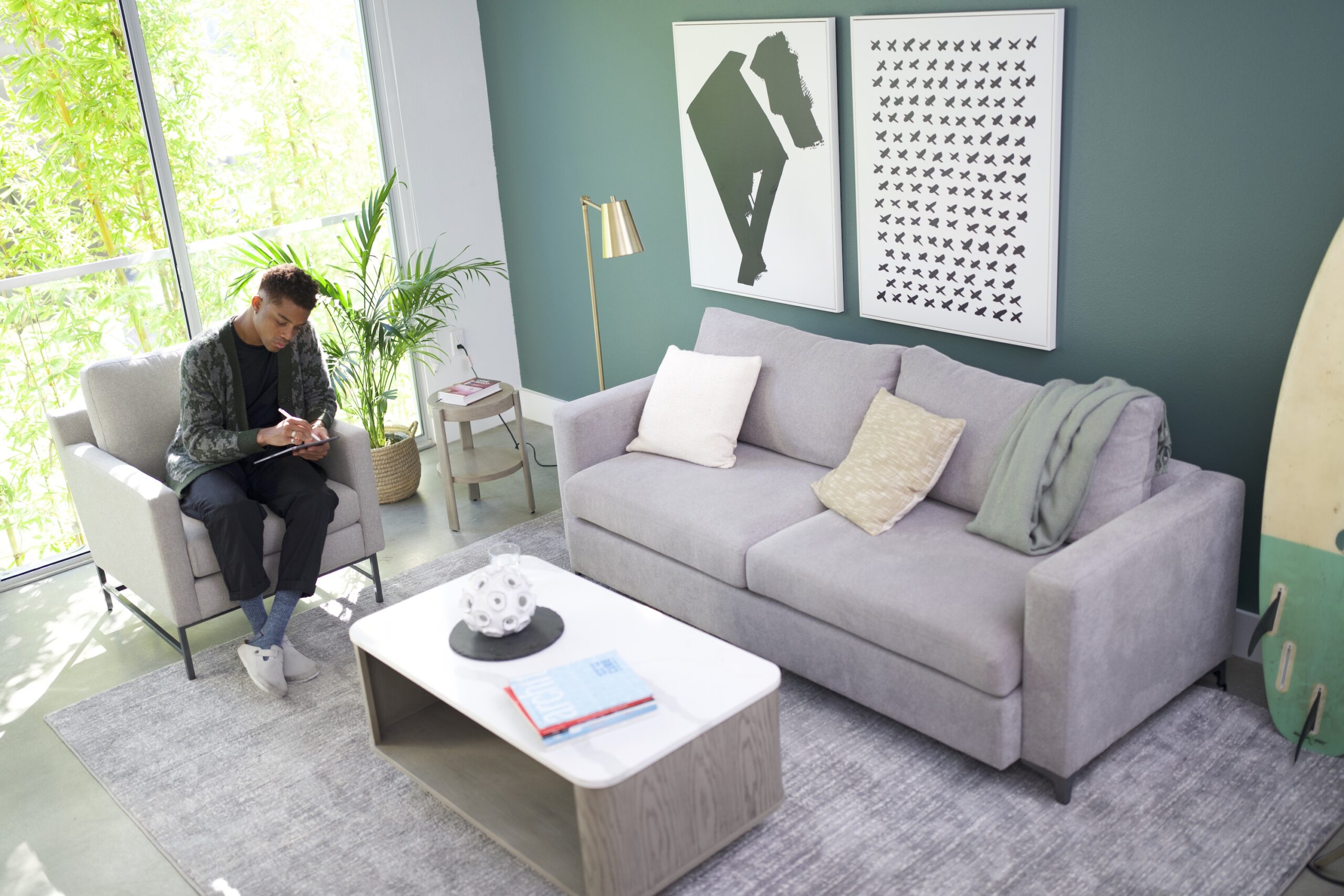
How Much Should You Save Before Moving Out?

It’s common for young adults to live with their parents after college, but if you’ve decided that you’re ready to move out and live on your own, it’s important to be financially prepared. There are a variety of things you’ll need to pay for when renting your first apartment or house—from new furniture to a security deposit—and you’ll want to make sure you have enough money saved up to comfortably cover these expenses.
If you’re ready to start the next chapter of your life and live on your own for the first time, here’s everything you need to know about how much money to save before moving out, as well as money-saving strategies to achieve your financial goals:
How much money to save before moving out

There are a variety of factors you’ll need to think about when figuring out how much money is necessary to move out, including things like your income level, where you plan to live, and moving costs, just to name a few. You’ll want to take each of these considerations into account as you decide on a savings goal.
Cost of living and rental costs
One of the largest factors you’ll need to consider is where you’re planning to live. Rent prices vary drastically based on location—the Boston Globe states that the median rent for a one-bedroom apartment in New York City is $3,780 per month in 2022. San Francisco, Silicon Valley, and Boston all have similarly high rent prices. However, the Globe notes there are cities in Ohio, Texas, and Kansas where the median rent prices are around $700 per month.
To get a sense of the cost of living in your city (or wherever you’re planning to move), spend some time browsing apartment listings. Take note of the prices for different-sized apartments—the difference between a one- and two-bedroom rental, for example—and scope out neighborhoods where you might want to live. This will give you an idea of how much you can expect to be paying for rent and how much you need to save up in advance. The higher the rent prices, the more money you’ll need to save.
Income and expenses
Another important consideration when you’re planning to move out is your current income. You’ll want to figure out how much rent you can afford comfortably—the general rule of thumb is that your rent should be less than 30% of your gross monthly income. That means if you make $5,000 per month, your rent should be $1,500 or less.
Using the information you’ve gathered about the cost of living in your area, evaluate whether your current income is enough for you to live comfortably. If your expected rent is going to cost more than 30% of your monthly income, you’ll want to save more money to use as a buffer if your budget is ever tight.
This is also a good time to list out other expenses that you’ll need to pay along with your rent. Student loans, public transportation, and credit card debt can all increase your monthly expenses, and if these additional costs are higher than expected, you’ll either want to pay them down or figure out ways to lower them before moving out. If your debt-to-income ratio is too high, you may struggle to meet your monthly rent payments.
Moving costs
You’ll also want to consider how much money the move itself will cost you. There are several expenses that you’ll need to factor into this number, including:
- The application fee for your apartment or rental
- Additional rental costs, such as the first month of rent and a security deposit. Some states also allow landlords to charge you the last month’s rent in advance.
- A broker’s fee, if someone is helping you find an apartment
- Renter’s insurance, which many apartments require
- The cost of professional movers, a moving truck, and/or packing supplies. If you’re moving out of state, you may need to calculate the cost of shipping your belongings, too.
- The cost of new furniture and home furnishings for your new place, if needed
Assuming you find an apartment where you can comfortably afford your monthly rent, this is where the bulk of your savings will go when you move. If your new apartment has a $50 application fee and rent price of $1,500 per month, you’ll need at least $3,050 upfront. This may quickly jump to $4,550 if your apartment requires the last month’s rent or if you have to pay a real estate agent. According to Nerdwallet, the average cost of renters insurance is around $180 per year, and Moving.com notes the average cost of a local move is $1,250.
Based on these numbers, you’ll need close to $6,000 saved up to cover the initial deposit and moving expenses—and that doesn’t include the price of furniture or other home furnishings.
Emergency fund
When moving out on your own, it’s beneficial to have an emergency fund to cover unexpected expenses. Your emergency fund can help to pay for things like appliance repairs/replacement, car repairs, medical bills, and utility bills, and it also serves as a safety net in case you lose your main source of income. Nerdwallet recommends keeping enough money to cover three to six months’ worth of living expenses in your emergency fund, and you’ll want to keep this money in a separate savings account where you can easily access it as needed.
So, for instance, if your rent is $1,500 and your other expenses total $700, your monthly living expenses would total $2,200. Based on this example, a good emergency fund would be between $6,600 and $13,200.
5 ways to save money to move out

As you can see, a good chunk of change is often needed to move out of your parents’ house, but there are several strategies you can use to save up faster. The following are five tips that millennials and other young people can use to save money:
1. Create a budget—and stick to it
Arguably the most important step when you’re trying to save money is to create a detailed budget. You’ll want to outline your current income and any fixed expenses, such as student loans, phone payments, car insurance, and so on. Once all these expenses are taken out of your monthly income, it’s time to divvy up your remaining money. Allocate a set amount of cash for groceries, gas, and other necessities, and do your best to stick to these limits each month. By following your budget, you’ll be able to put more money away each month and reach your goal faster.
2. Open a high-yield savings account
You can make your money work for you with the help of a high-yield savings account. As you save money to move out, put it in a designated fund that has a higher interest rate—it might only be 1% or 2%, but you’ll earn a small amount of interest each month without doing anything extra.
3. Find a side hustle
Another way to save money faster is by finding an additional source of income. Whether it’s picking up shifts at a local bar or finding freelance remote work that you can do in your spare time, you’ll be able to earn extra money that can go toward your moving fund.
4. Find a roommate (or two)
Most of your monthly rental costs will be cut in half if you decide to live with a roommate—you’ll only be responsible for half the deposit, half the rent, and half the utilities. This is a great option if you live in a city where the cost of living is expensive, and you may even want to consider having multiple roommates if you can find a large enough apartment.
5. Plan a DIY move
While convenient, a professional mover can be quite expensive, and if you want to get out of your parents’ house ASAP, you can save money with a DIY move. You can ask local grocery stores for free boxes to pack up your belongings and enlist a friend with a truck to help move everything. Even renting a U-Haul moving van can be more affordable than paying for movers.
When it comes time to furnish your new digs, shop for secondhand furniture and decor at thrift stores and garage sales to keep your expenses low. It may take a few months to find all the items you need, but the cost savings are worth it in the long run.
Save money with flexible leases
If you’re moving out for the first time, you can reduce your expenses by renting from Landing, which offers fully furnished apartments in hundreds of cities around the country. Landing members never have to pay fees like security deposits or first month’s rent, and you’ll be able to live comfortably without worrying about buying furniture. Plus, with flexible leases, you can move to a new place easily without worrying about breaking your lease. Learn more about what a Landing membership can do for you today!









